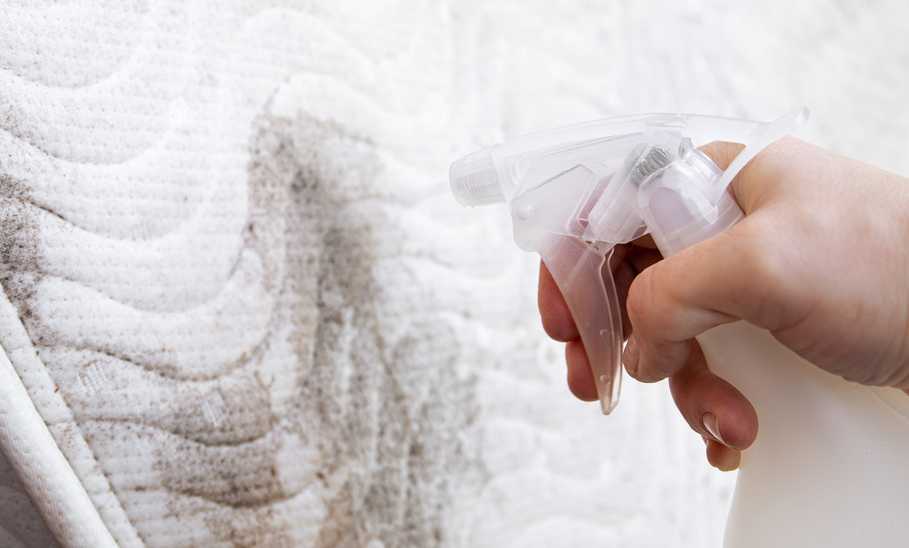How to Get Stains Out of a Mattress Like a Professional

Our evaluations and opinions are not influenced by our advertising relationships, but we may earn a commission from our partners’ links. This content is created by TIME Stamped, under TIME’s direction and produced in accordance with TIME’s editorial guidelines and overseen by TIME’s editorial staff. Learn more about it.
Depending on the type of stain you’re dealing with, you may need one or more of the following tools to clean a mattress. According to Angela Brown, host of the Ask a House Cleaner show and podcast, you will need:
To this list, Diana Ciechorska, Founder of Park Slope Cleaning, adds:
Be sure to check the care label on your mattress before you start any of these treatments, and pay attention to any special instructions or warnings. If you have a memory-foam mattress, the main thing to be careful of is getting it too wet. They absorb water quickly and are tough to dry completely, so use the minimum amount of water necessary when cleaning—or you might end up with mildew.
Whether it’s your not-quite-potty-trained kid, a wayward pet, or a blackout drunk guest, pee stains on your mattress are no laughing matter. To remove them, Brown recommends the following steps:
Ciechorska also recommends deodorizing the area with baking soda when you’re done, then vacuuming it up, a step that can be added to every clean-up set of instructions listed here.
Is it more urine? Is it sweat? Is it, somehow, something worse? Whatever it is, Brown suggests trying the following:
Humid nights, fevers, anxious dreams, or you finished an intense run and passed out before you could make it to the shower: There are many ways you could end up with a sweaty mattress. Brown suggests the following steps to address it:
Blood on the mattress? Never a good look. To lose that “are they a serial killer?” vibe, Ciechorska advises doing the following:
Welp, it’s happened—however it happened—and now you have to deal with it. Tackle those nasty vomit stains with these tips from Ciechorska:
Brown also suggests trying OdoBan again, since the enzymes will break
down the protein in the vomit and help to remove stains and odors at the same time.
Who among us, right? To remove that wine stain, Brown says you should:
Breakfast in bed seems like such a good idea—right up until it doesn’t. Scrub out those coffee stains with this advice from Ciechorska:
If you’re not sure what you’re dealing with, try these steps from Brown first and see if the stain lifts:
If your mattress remains smelly despite the stain being gone, Ciechorska advises trying these steps:

“It’s generally only advisable to wash some of the mattress,” cautions Brown. “Extra moisture in a bed can damage the materials, take forever to dry, and lead to mold growth. Spot cleaning and maintaining a mattress will prolong its life and keep it pleasant.”
The main trick to spot cleaning a mattress is to act quickly. Gently blot up anything still seeping in, then do the following, per Brown’s advice:
There are plenty of signs you might need a new mattress, ranging from back pain to trouble falling or staying asleep. But from a cleanliness perspective, “if your mattress has frequent stains, strong odors, signs of mildew that cannot be effectively cleaned, or traces of bed bugs, consider replacing it,” says Brown.
Ciechorska adds that, “If your mattress has reached or exceeded the average lifespan of eight to ten years, it’s worth considering a replacement. Around this time, even with proper cleaning, older mattresses tend to experience a decline in hygiene.”
Prevention is better than cure, and it’s certainly better than scrubbing urine stains out of a smelly mattress. “The easiest way to prevent mattress stains is to invest in a high-quality, waterproof mattress protector,” says Ciechorska. “This protective cover acts as a barrier against spills, stains, and dust mites, helping to keep your mattress clean.”
“They’re like big pillowcases that slide over both sides of a mattress and zip up the side,” explains Brown. “They’re often used to protect allergy sufferers from mattress fibers and dust mites, but they also create a barrier from body soil, sweat, oils, hair, urine, blood, pet dander, food, or anything else that could stain a mattress. Mattress covers can easily be washed in a washing machine to remove stains that otherwise would have been on the bed itself.”
Brown also suggests that, “The next best way to prevent mattress stains is to not eat or drink in bed,” but where’s the fun in that?
“There’s no one approach that works for every kind of stain,” reiterates Brown. “Stains can be chemically different and may need slightly different approaches to removing them from mattresses.” That said, if you’re not sure what kind of stain you’re dealing with, Brown suggests a basic approach to try:
Suddenly that mattress protector seems like a pretty good idea.

The information presented here is created by TIME Stamped and overseen by TIME editorial staff. To learn more, see our About Us page.



